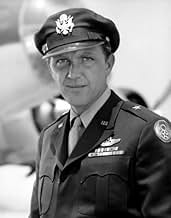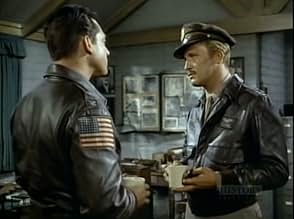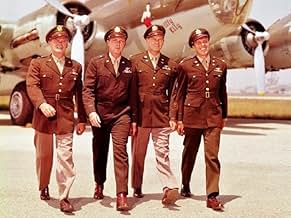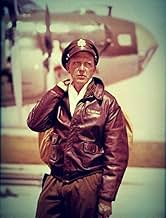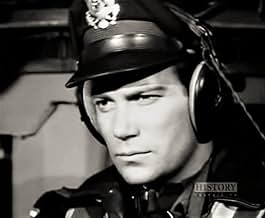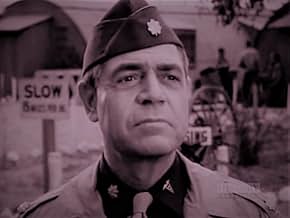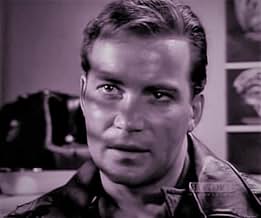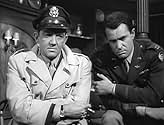12 O'Clock High
- TV Series
- 1964–1967
- 1h
A WWII bomb group commander must fill the shoes of his predecessor and get the performance rating up to snuff. He struggles with his own men, until he is able to develop pride in the group a... Read allA WWII bomb group commander must fill the shoes of his predecessor and get the performance rating up to snuff. He struggles with his own men, until he is able to develop pride in the group and win the men over, but at a cost to him.A WWII bomb group commander must fill the shoes of his predecessor and get the performance rating up to snuff. He struggles with his own men, until he is able to develop pride in the group and win the men over, but at a cost to him.
- Won 1 Primetime Emmy
- 2 wins & 2 nominations total
Browse episodes
Featured reviews
It is truly fine to be among the fans and supporters of this fine old chestnut. I am also in my fifties, and I knew a lot of WWII vets when I was a kid. My father rebuilt the big airfield at Foggia in Italy and the pastor of the church I went to was a nose gunner in B-24's. I've known 17, 24, and 29 pilots. To them the series was right on the money.
I always liked Lansing's Savage better than Peck's, but none of you noticed that the first few episodes were written by the men who wrote the original novel. In most cases, that usually makes for high production values and attention to characterization. Lay and Bartlett had a good ear for the experience because they lived it.
I have used "The Men and the Boys" and "Golden Boy Had Nine Black Sheep" as teaching tools in my European history and American history classes. The kids generally take to them, once they get past them being in black and white.
When this comes out so I can put it alongside "Rawhide" on my shelves, I will truly be a happy man.
Bob Potter Wilmington, Delaware
I always liked Lansing's Savage better than Peck's, but none of you noticed that the first few episodes were written by the men who wrote the original novel. In most cases, that usually makes for high production values and attention to characterization. Lay and Bartlett had a good ear for the experience because they lived it.
I have used "The Men and the Boys" and "Golden Boy Had Nine Black Sheep" as teaching tools in my European history and American history classes. The kids generally take to them, once they get past them being in black and white.
When this comes out so I can put it alongside "Rawhide" on my shelves, I will truly be a happy man.
Bob Potter Wilmington, Delaware
10thetsak
I watched this program with my dad, who was a WWII vet and former POW, when I was very little. Recently, I purchased the entire set and began to watch all over again. I, too, did not accept the death of General Savage and always thought they would find him somewhere and bring him back. The naiveté of the young....
I always felt Colonel Gallagher was a poor replacement until I began to really watch these episodes as an adult. I think people tend to compare the two and there is just not a comparison to be made. Frank Savage was a maverick and a very decisive character. You didn't see him delving out too much sympathy or being overly sentimental. Joe Gallagher had a lot of baggage to carry around with an overbearing General (Max Gallagher) for a father and issues with his self worth. Each character should be judged for their own merit. We knew a lot more about Joe than we did about Frank.
I don't think Robert Lansing should have been replaced and I do think the program would have fared very well had he been allowed to continue the role. However, since the powers that be decided to replace him, we should judge Paul Burke for the person he was portraying and not for his ability to play like he was Frank Savage.
I always felt Colonel Gallagher was a poor replacement until I began to really watch these episodes as an adult. I think people tend to compare the two and there is just not a comparison to be made. Frank Savage was a maverick and a very decisive character. You didn't see him delving out too much sympathy or being overly sentimental. Joe Gallagher had a lot of baggage to carry around with an overbearing General (Max Gallagher) for a father and issues with his self worth. Each character should be judged for their own merit. We knew a lot more about Joe than we did about Frank.
I don't think Robert Lansing should have been replaced and I do think the program would have fared very well had he been allowed to continue the role. However, since the powers that be decided to replace him, we should judge Paul Burke for the person he was portraying and not for his ability to play like he was Frank Savage.
This is one of the great television shows of the sixties that needs to be brought back. I don't know if the problem was popularity, subject, or because it was in back and white. Color would have killed it. The show took a minor dive when Robert Lansing left, but it was great entertainment and an example of great television they don't do today. I can still catch myself humming the theme.
'Twelve O'Clock High', the television version of Gregory Peck's classic war film, was a remarkable achievement when it debuted, in 1964. While utilizing stock war footage for bombardment and dogfight scenes, the story lines addressed the timeless issues of warfare (heroism and cowardice, integrity, loyalty) on an intimate scale that 'the big screen' couldn't match. It also made a star of Robert Lansing, the rugged, pensive actor who had previously garnered rave reviews in the series, '87th Precinct'. His 'Frank Savage' was a man of courage and a conscience, and he lifted each episode far above the 'typical' TV war show of the era.
With a soaring, beautiful theme (by the versatile Dominic Frontiere), the strong production values of Quinn Martin, and a veteran supporting cast including Frank Overton and John Larkin, the series garnered rave reviews, and was poised for a long, award-winning 'life' on the small screen.
Unfortunately, ABC stepped in, however, and decided to 'improve' the series...
The network produced figures that indicated that younger audiences weren't watching in big enough numbers, and that the show didn't provide enough 'action' for fans craving battle scenes. Lansing wasn't 'pretty' enough to attract female viewers, and there were no 'hunky' co-stars to fill the gap. As for offering a 'Message'? Sure, that was okay...as long as it didn't interfere with the bullets flying, the plane crashes, and the mostly happy endings.
So the program was retooled for the second season. Robert Lansing was killed off, shot down over Europe, and Paul Burke was brought in as his replacement. Best known from the cop show, 'Naked City', Burke was actually two years older than Lansing, but he had a more 'classic' leading man 'look', and had gotten a lot of female fan mail during the run of the earlier show. Most of the older cast also got the ax, and young Chris Robinson was brought in, as another potential 'heartthrob'.
The result of the changes was a diluted show, with less 'heart', if more 'glamor' and 'action'. While Burke tried to provide Lansing's subtlety and depth, he simply wasn't as good an actor, and the series lost the very qualities that had made it, initially, so memorable.
When 'Twelve O'Clock High' was canceled, after struggling through two seasons with the new cast, ABC downplayed the event, choosing to ignore the fact that the series had begun so promisingly, and that they had 'killed' it.
But for those of us who remember that first season with fondness, it is a reminder that creative minds make 'Classic TV', not network demographics!
With a soaring, beautiful theme (by the versatile Dominic Frontiere), the strong production values of Quinn Martin, and a veteran supporting cast including Frank Overton and John Larkin, the series garnered rave reviews, and was poised for a long, award-winning 'life' on the small screen.
Unfortunately, ABC stepped in, however, and decided to 'improve' the series...
The network produced figures that indicated that younger audiences weren't watching in big enough numbers, and that the show didn't provide enough 'action' for fans craving battle scenes. Lansing wasn't 'pretty' enough to attract female viewers, and there were no 'hunky' co-stars to fill the gap. As for offering a 'Message'? Sure, that was okay...as long as it didn't interfere with the bullets flying, the plane crashes, and the mostly happy endings.
So the program was retooled for the second season. Robert Lansing was killed off, shot down over Europe, and Paul Burke was brought in as his replacement. Best known from the cop show, 'Naked City', Burke was actually two years older than Lansing, but he had a more 'classic' leading man 'look', and had gotten a lot of female fan mail during the run of the earlier show. Most of the older cast also got the ax, and young Chris Robinson was brought in, as another potential 'heartthrob'.
The result of the changes was a diluted show, with less 'heart', if more 'glamor' and 'action'. While Burke tried to provide Lansing's subtlety and depth, he simply wasn't as good an actor, and the series lost the very qualities that had made it, initially, so memorable.
When 'Twelve O'Clock High' was canceled, after struggling through two seasons with the new cast, ABC downplayed the event, choosing to ignore the fact that the series had begun so promisingly, and that they had 'killed' it.
But for those of us who remember that first season with fondness, it is a reminder that creative minds make 'Classic TV', not network demographics!
I recently had a chance to see this show again after many years. I thought that it was a great show before, and I feel the same way now (I refer to the Robert Lansing/season one show -- I agree completely with the comments that head this list).
Robert Lansing, and the writers, show how leadership happens, when the commander doesn't have the option of starting over with someone else. He knows that his unit is only as strong as the weakest member, and he uses his knowledge and his leadership ability to get his men to do their best, even when it may cost him personal popularity.
The combat scenes are well done, but so are the scenes when the airmen are back at the base, or off duty, in wartime England, socializing with the civilians before risking their lives on another day time bombing run deep into Germany.
Robert Lansing, and the writers, show how leadership happens, when the commander doesn't have the option of starting over with someone else. He knows that his unit is only as strong as the weakest member, and he uses his knowledge and his leadership ability to get his men to do their best, even when it may cost him personal popularity.
The combat scenes are well done, but so are the scenes when the airmen are back at the base, or off duty, in wartime England, socializing with the civilians before risking their lives on another day time bombing run deep into Germany.
Did you know
- TriviaWhile trying to get sponsors for this series, the producers approached the Volkswagen executives and showed them the pilot show which featured actual bombing footage from the war. During the film, one of the executives recognized the plant that was being bombed as the Volkswagen plant which had made cars for the German Army at the time. He commented, "There goes our plant", and the executives then and there decided not to sponsor the show.
- GoofsThroughout the series, actors regularly smoked king-sized filter cigarettes, which didn't exist in WWII.
- ConnectionsFollows Twelve O'Clock High (1949)
- How many seasons does 12 O'Clock High have?Powered by Alexa
Details
- Release date
- Country of origin
- Language
- Also known as
- Twelve O'Clock High
- Filming locations
- Chino Airport - 7000 Merrill Avenue, Chino, California, USA(Archberry Field exteriors.)
- Production companies
- See more company credits at IMDbPro
- Runtime1 hour
- Color
- Aspect ratio
- 1.33 : 1
Contribute to this page
Suggest an edit or add missing content



